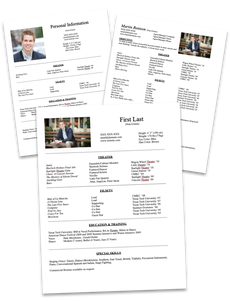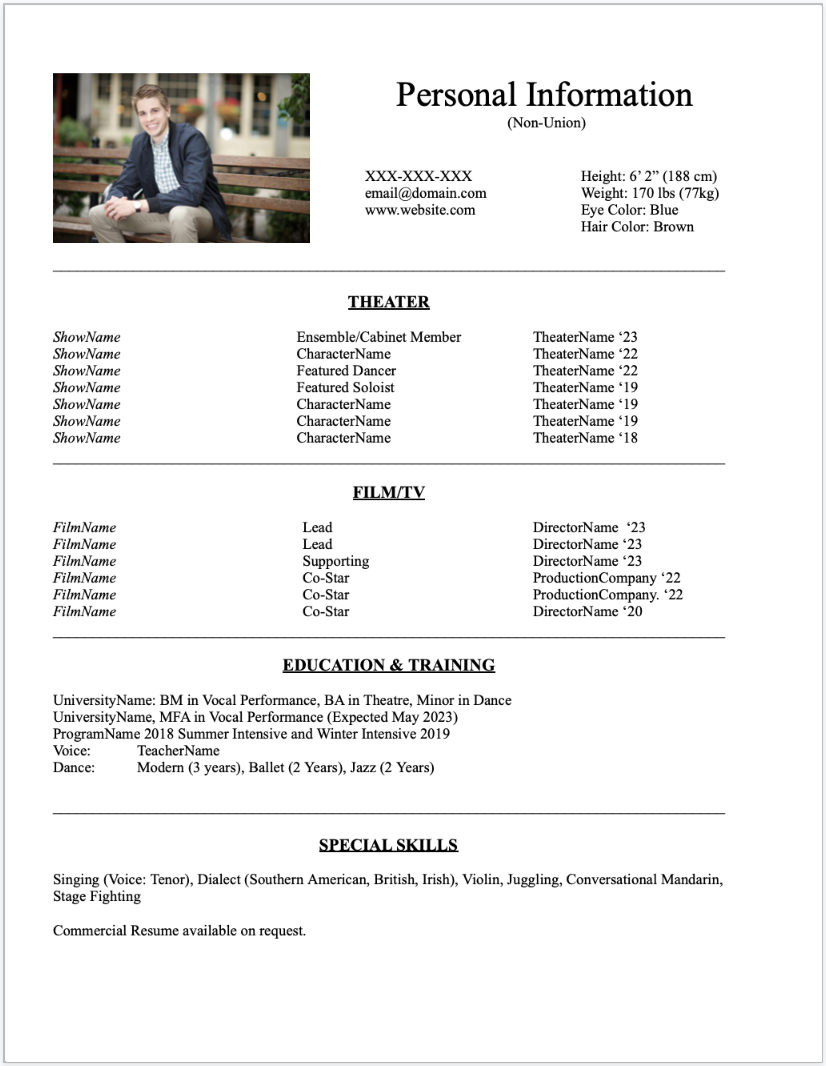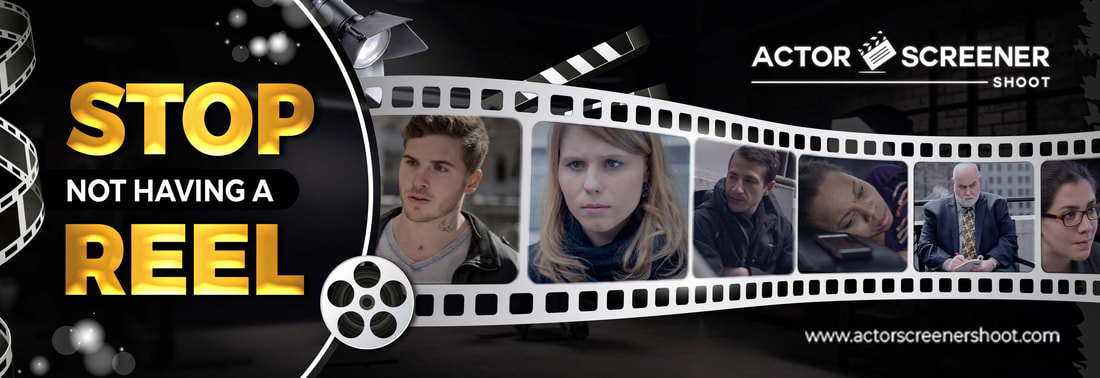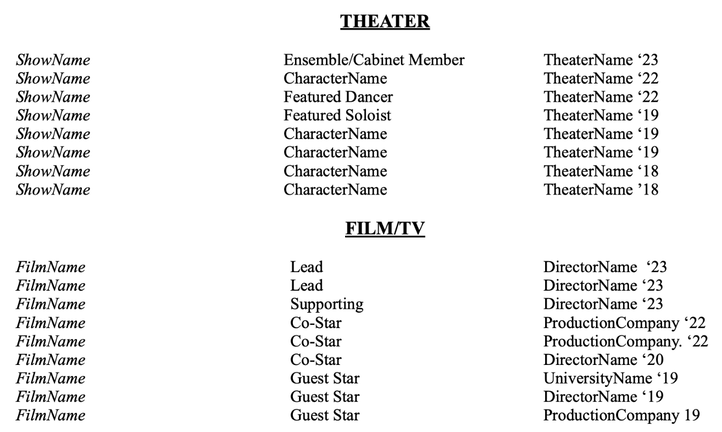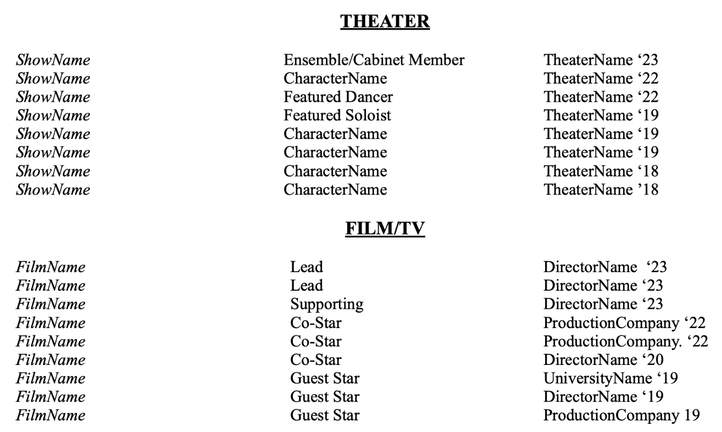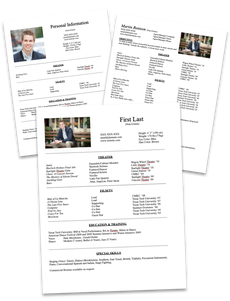Here's How to Make an Acting Resume, Step by Step.
|
|
Acting Resume: The Ultimate Guide
What is an Actor Resume?
An actor resume is a quick, easy-to-look-at reference that tells casting directors your experience. It shows the most noteworthy roles you've played along with your training, special skills, and contact information.
What Does an Acting Resume Look Like?
|
An acting resume is broken up into four sections, which we'll be covering in depth in this article:
See the sample resume so you have an idea of what each section looks like: |
How to Structure Your Acting Resume
"How do I make an acting resume with no experience?" Well, don't worry just yet. There are plenty of ways to book roles with no experience, and believe it or not you can absolutely create an acting resume without any credits at all. We'll discuss that soon.
In this section, we'll cover everything needed for each section of your professional acting resume, starting from the top (Personal Information) and moving all the way down to the bottom (Special Skills).
Before you start, I recommend you download my free Google Docs resume templates so everything is in perfect alignment and formatted correctly. Then, follow along!
In this section, we'll cover everything needed for each section of your professional acting resume, starting from the top (Personal Information) and moving all the way down to the bottom (Special Skills).
Before you start, I recommend you download my free Google Docs resume templates so everything is in perfect alignment and formatted correctly. Then, follow along!
Section 1: Personal Information
This is where you'll list the basics, such as your contact info and descriptive information about yourself. Use the following checklist and include everything you can (it's OK if you don't have everything listed below):
- Your name, phone number, email address (don't include your home address), and website. Note that having a website is not mandatory but can definitely make you appear more established.
- If you have an agent or manager, list their contact information. Some may prefer you to hide your own contact information and only list theirs, but you can speak with them about it.
- Include your height, weight, hair and eye color. If you're in the US, be sure to use inches and feet, and if you're outside the United States use the metric system. Do not include your age unless you are under 18.
- Include a headshot to fill up space. Although it's true that you'll have your headshot stapled to the back of your resume, you can also include a different one printed on the front as a way to fill up some of the white space (especially if you don't have many credits yet).
- Include vocal type or range if you sing. An example would be Tenor, or Low E-Flat to High D.
- Include union affiliations. If you're just starting out, chances are you're not a part of a union yet, so you should write "Non-Union." Otherwise you can write SAG-AFTRA, Equity/AEA or SAG-AFTRA Eligible.
Having trouble with formatting/alignment? Download our free actor resume templates here.
Section 2: Credits
So how do you list roles on an acting resume? Well, the Credits section is where the bulk of your resume content will be, unless of course you're just starting out (in which case the bulk of your resume will be under Training & Education).
Follow the below guidelines to ensure your resume looks professional:
- What to Add: If you're older than 25, avoid including credits from productions you did when you were younger than 18. If you're younger than 25, you can add roles you've played within the past 5-10 years, but don't go further back than that. It's completely fine to include roles from classes and workshops.
- Alignment: Have the name of the production in the left-most column, the name of your role in the middle column, and the name of the director or theater company (whichever is more well-known) in the right column.
- Categories: Usually, you'll see credits listed under two categories: Film/TV and Theater. When you're first starting out, it's OK if you only have credits from one of these, like Theater. Just be sure you divide up the categories properly, and don't include a category if you have no credits for it.
- Extra Work: "Should you put extra work on your acting resume?" No, it's not a good idea to include extra (background actor) work on your resume. The more extra work you include, the more likely a casting director will think you specialize in that instead of speaking roles!
- Character Names: For Theater, include character names and then in parentheses next to it, add "cast," "ensemble," etc. For Film/TV, it's best to avoid character names completely and just use the role descriptions ("lead," "supporting," etc.).
- Famous People: If you had the opportunity to work with a famous actor in a scene, add their name in parentheses next to the role. An example would be (w/ Lindsay Lohan).
- Voiceover Credits: "How do you list a voice over on a resume?" Add another section to your resume if you do voiceover work. For voiceover credits, you'll list them out exactly the same way as for Film/TV credits, with three columns.
- Commercial Credits: Do not list commercials on your primary resume. Create a separate resume for commercials and only email it to people when requested. This is because of possible conflicts of interest (for example, if you were the lead in a Coca Cola commercial, PepsiCo would NOT want you to be in their commercial because people might think of Coca Cola when they see you instead).
- Lead With Your Most Impressive Stuff: Put your biggest credits first and do not include dates of productions on your resume.
Having trouble with formatting/alignment? Download our free actor resume templates here.
Section 3: Training & Education
In this section, you'll list out formal training (if related to acting), acting workshops, seminars, studio classes, master classes, or private coaching. This also includes special training not directly related to acting, such as singing or stunt-work.
What Casting Directors are Looking For:
- Names of program directors, teachers, or educators they recognize (try typing your instructors' names into Google – if their name shows up in lots of articles, chances are casting directors will recognize them).
- Names of schools or workshops they recognize (you can use the same strategy as above to see how well-known the workshop/school is).
- Length of time you studied a particular skillset, and how recently you studied it.
- Type of training you've had (learn more about these in my guide: Types of Acting Techniques: The Ultimate Guide).
There's no specific right or wrong format to list out your training, but just make it easy for a casting director to see what you've done – especially if you don't have many credits.
Using a two-column format like below can make it easy for them to read. Including dates is optional but recommended if you completed the training within the past 2-3 years.
If you need to fill up a lot of space, feel free to list bullet points under each training, showing specifically what knowledge was gained. Example:
2011-2015, BFA in Acting
University of Southern California, Los Angeles
- Pursued my passion for acting and singing
- Won “Best Actor" Award in USC's Student Film Festival
- Starred as lead in three college theatre productions
Having trouble with formatting/alignment? Download our free actor resume templates here.
Section 4: Special Skills
Not only do special skills help you book more roles because they're unique and less people have them, but they also use up some of that dreaded white space on your resume.
"So what skills should I put on my acting resume?" Here are some examples:
- Special Abilities (singing, cry on cue, etc.)
- Dancing Ability (hip hop dance, ballet, etc.)
- Combat Training (weapons handling, marital arts training, etc.)
- Accents (Southern dialect, Irish accent, etc.)
- Fitness Level (7% body fat, 6 pack abs, etc.)
- Fluency in Other Languages (Spanish, Mandarin, etc.)
- Musical Instruments (guitar, violin, piano, etc.)
- Driver's License (yes, this can be listed since many people don't have one)
- Acrobatic Abilities (flipping, juggling, etc.)
- Sports/Games (skiing, fencing, golf, chess etc.)
If you want to go deep on this and see TONS of examples of special skills, check out our: Acting Resume Special Skills Guide
Put whatever you think is most noteworthy first so casting directors notice it. And don't say you can do something if you're not actually proficient at it!
Having trouble with formatting/alignment? Download our free actor resume templates here.
Download Our FREE Google Docs Resume Templates
Save Yourself the Frustration of Alignment & Formatting!
Most of the actor resume templates found online either require special software or are very complicated to use and edit. For that reason, we've put together 3 super simple Google Docs templates ANYONE can use (no matter what type of computer you have).
Here's what you get:
Here's what you get:
|
Important Mistakes to Avoid on Your Acting Resume
- Your resume MUST be saved as a PDF format. Do not send Microsoft Word formats because the size and style changes on different computers, and what might have been one page with perfect alignment on your computer will suddenly look all messed up (and sometimes even two pages) on someone else's computer. PDF format always keeps the alignment perfect no matter where you send your resume.
- It must be easy to read. Make sure to use professional fonts like Times New Roman, Helvetica, Garamond, or Arial.
- Each heading should stand out. The different sections of your resume, such as TV/Film, Theater, Training & Education, etc., should be bigger and/or a different style than the rest so they stand out.
- Only use black and white. Avoid using different colors because some casting directors print resumes on black & white printers, and your section headings won't stand out. They also assume you're inexperienced and new if you use colored fonts on your resume.
- When printed, it must ONLY be one page and cut to fit on the back of your 8" X 10" headshot. You’ll align your resume so it fits perfectly on the back of your headshot, and then staple it at all four corners (don't use tape or paperclips). Then you can cut off the extra paper with scissors. Don't print your resume directly on the back of your headshots because it's going to change every time you book a new role. Watch the video below to learn how to attach your headshot to your resume:
3 Secret Actor Resume Hacks
Think "Outside the Industry"
As Einstein says, "Insanity is doing the same thing over and over and expecting different results."
I'm all about thinking differently, and I teach actors how to break the rules and do things most other actors don't consider.
In fact, one of my clients landed his first-ever Broadway role in just 4 weeks of implementing some of my "outside the industry" strategies.
So now that you understand the basics of a professional acting resume, I'd like to present you with three "outside the industry" hacks you can use to make your resume even MORE effective:
I'm all about thinking differently, and I teach actors how to break the rules and do things most other actors don't consider.
In fact, one of my clients landed his first-ever Broadway role in just 4 weeks of implementing some of my "outside the industry" strategies.
So now that you understand the basics of a professional acting resume, I'd like to present you with three "outside the industry" hacks you can use to make your resume even MORE effective:
"Outside the Industry" Hack #1:
Awards and Quotes
A unique way to stand out from other actors (and use up some dreaded "white space") is to include noteworthy reviews or quotes from people you've worked with in the industry. You can list 2-3 simple one-sentence reviews at the very bottom of your resume (center-aligned), such as "John Doe was one of the most consistently on-time and professional actors I've ever had the pleasure of working with. – Jane Smith (Director, Bluefin Dolphins)"
Don't have any quotes? Just email some past teachers or friends you've worked with and ask them to write 1-2 sentences. Obviously, the bigger their names the better, but even if they're unknown people, you can still include their quotes on your resume just to provide some "social proof" so to speak.
You should also include any awards you've won in parentheses next to the role you played. Keep in mind that these awards should actually be noteworthy and professional – don't mention the high school "Funniest Actor" award you won for the little video you made with your friends.
Don't have any quotes? Just email some past teachers or friends you've worked with and ask them to write 1-2 sentences. Obviously, the bigger their names the better, but even if they're unknown people, you can still include their quotes on your resume just to provide some "social proof" so to speak.
You should also include any awards you've won in parentheses next to the role you played. Keep in mind that these awards should actually be noteworthy and professional – don't mention the high school "Funniest Actor" award you won for the little video you made with your friends.
"Outside the Industry" Strategy #2:
Resume Objective
A resume objective tells casting directors what your goals are... or if you do it right, why they should hire YOU over other actors for this specific project.
Here's an example of a weak resume objective: To become a successful, world-renowned actor who is reputed for her craft and compelling performances on stage and film.
This is OK, but is focused on YOU, instead of the production. Casting directors don't care about you, they only care about what you can do to help them.
Instead, do a bit of googling on the production and then tailor your objective to the type of project you're submitting to. If you're submitting to a slapstick comedy TV show, for instance, chances are the production wants an actor who can make the audience laugh. So you can customize your resume objective like so:
Strong objective for a comedy film submission: To bring smiles and laughter to the faces of as many people in the world as possible through my acting.
Do you think the casting director will notice? You bet they will!
If you're submitting to a dramatic indie film, think about the purpose of the film... is it trying to share an important message with the world? Is it trying to make a political statement? Make an educated guess about the purpose of the project and then tailor your resume objective to that.
Since it's right at the top of your resume, the casting directors will notice and be more likely to bring you in for an audition!
Here's an example of a weak resume objective: To become a successful, world-renowned actor who is reputed for her craft and compelling performances on stage and film.
This is OK, but is focused on YOU, instead of the production. Casting directors don't care about you, they only care about what you can do to help them.
Instead, do a bit of googling on the production and then tailor your objective to the type of project you're submitting to. If you're submitting to a slapstick comedy TV show, for instance, chances are the production wants an actor who can make the audience laugh. So you can customize your resume objective like so:
Strong objective for a comedy film submission: To bring smiles and laughter to the faces of as many people in the world as possible through my acting.
Do you think the casting director will notice? You bet they will!
If you're submitting to a dramatic indie film, think about the purpose of the film... is it trying to share an important message with the world? Is it trying to make a political statement? Make an educated guess about the purpose of the project and then tailor your resume objective to that.
Since it's right at the top of your resume, the casting directors will notice and be more likely to bring you in for an audition!
"Outside the Industry" Strategy #3:
Customize Your Resume for Important Submissions
There are three ways you can customize your resume so a casting director feels more compelled to bring you in. Here they are:
- Push Certain Roles Higher: If you want more Film/TV roles, move those types of credits higher on your resume. Minimize your theater credits and mention even the smallest of the small film credits you've done (even if they were just tiny unpaid student films) just to give the impression that you have as much experience as possible in Film and Television.
- Customize the Special Skills section of your resume: To show how qualified you are for a role, move to the beginning or bold your most relevant special skills so the casting director notices them!
- Create separate resumes for each type of work you do: Eventually as you build up your credits, you can make separate resumes for separate types of work. Most actors know they can have a Film/TV Resume, a Theater Resume, and a Voiceover Resume, but an "outside the industry" way of thinking is this: create separate resumes for your different "types." If you are submitting for a cop role, create a resume specifically focused on all the cop and detective roles you've played. This will show casting directors you're super experienced in playing that kind of character!
WANT A TALENT AGENT TO GROW YOUR CAREER?
Knowing how to create a great acting resume is important, but it's just one small part of growing your acting career.
If you want to act full-time, your first major goal should be to get a legitimate, hardworking talent agent.
I highly recommend checking out this short podcast episode, where I share:
Listen in using the player below, and be sure to hit Subscribe (you can listen in on Spotify, Apple Podcasts, and more).
If you want to act full-time, your first major goal should be to get a legitimate, hardworking talent agent.
I highly recommend checking out this short podcast episode, where I share:
- The exact steps to getting a great, hardworking, and legitimate talent agent.
- How to shortcut the process significantly, especially for new actors.
- Tips to avoid scammers in the industry (there are a lot of them!)
Listen in using the player below, and be sure to hit Subscribe (you can listen in on Spotify, Apple Podcasts, and more).
|
Martin Bentsen (author of this guide) is an actor marketing coach who uses strategic thinking to help actors book more work. He’s helped over 14,000 actors with their careers and actor headshots since 2009 and his photography studio City Headshots is ranked #1 on Yelp. He’s spoken at NYU, The New England Theater Conference, The Actor’s Green Room, and other venues. Want to book more acting work by thinking strategically? Start with his free Actor’s Toolkit to create new opportunities right away, or visit his website at www.martinbentsen.com. |
Some Additional Acting Resume Q&A
What is an Actor's Resume Called?
This is a common question, but the answer is simple: It's called an Actor Resume. There is no special terminology for it!
Some people call it an Acting CV (curriculum vitae), which is Latin for "course of life" – essentially someone's life work, consolidated onto one page.
Some people call it an Acting CV (curriculum vitae), which is Latin for "course of life" – essentially someone's life work, consolidated onto one page.
Can You Lie on Your Acting Resume?
NO! Do NOT outright lie on your acting resume because it can immediately get you blacklisted by the industry.
An example of a lie is completely making up a fake credit on your resume – for instance, saying you played the lead in a student (or professional) film if you never actually did. If found out, casting directors will share your name with each other so you never get hired again.
Another example of lying is called "padding" your resume, which is also frowned upon in the industry. An example would be taking a tiny production of Les Miserables you did at a school and removing the "school" part so it looks like you were in a Regional or Off-Broadway production.
An example of a lie is completely making up a fake credit on your resume – for instance, saying you played the lead in a student (or professional) film if you never actually did. If found out, casting directors will share your name with each other so you never get hired again.
Another example of lying is called "padding" your resume, which is also frowned upon in the industry. An example would be taking a tiny production of Les Miserables you did at a school and removing the "school" part so it looks like you were in a Regional or Off-Broadway production.
Can You Audition Without a Resume?
You can! But keep in mind that it's generally harder to get invited to auditions without a resume. Here are some ways to get called in without a resume:
- Become friends with people in high places. You can meet people by attending film festivals, playhouses, or other places where people in the industry might congregate (such as industry events like Actor's Pro Expo). Then if you keep in touch with them, they might overlook the fact that you have no resume and let you audition for a role (if they like you). My free Actor's Toolkit shows you how to become friends with almost anyone in the industry by sending them an email or social media message (even if you haven't met them in person).
- Shoot a scene for your reel. You can hire a reel production company like Actor Screener Shoot to shoot a scene for your reel, and if your acting is on point, casting directors will overlook the fact that you have no resume or credits and just call you in based on the clip you send them. In some cases, a single great clip alone is enough to get you in the door!
- Create a resume without any credits. If you have any training (even just high school or middle school theater programs), you can list it on your resume. Casting directors want to know about more than just your credits, such as your education, special skills, and even personal information like height and vocal range.
- Become younger again. Just kidding! But seriously, if you're a student and haven't graduated high school or college, casting directors are much more lenient and don't care if you have no credits on your resume. The more years past graduating you are, the harder it becomes to get in the room without a resume.
How Do You Build Up a Resume?
"Can you put student films on a resume?" Absolutely! The fastest way to start getting credits is to audition for unpaid student productions.
You can submit to projects through websites like Actor's Access or Backstage, and then whenever you book a role, you can immediately add it to your resume – even before they shoot! And keep in mind: if you're hired to act in a production and it gets cancelled, you can still list the credit on your resume because you booked it.
I've written an in-depth guide on how to get called in without a reel, and I'd happy to send it to you for free! Just click here to get instant access.
You can submit to projects through websites like Actor's Access or Backstage, and then whenever you book a role, you can immediately add it to your resume – even before they shoot! And keep in mind: if you're hired to act in a production and it gets cancelled, you can still list the credit on your resume because you booked it.
I've written an in-depth guide on how to get called in without a reel, and I'd happy to send it to you for free! Just click here to get instant access.
--About the Author of this Guide--
|
Martin Bentsen uses “outside the industry” thinking to help actors book more work. He’s helped over 6,000 actors with their careers and actor headshots since 2009 and his photography studio City Headshots is ranked #1 on Yelp. He’s spoken at NYU, The New England Theater Conference, The Actor’s Green Room, and other venues. Want to book more work by thinking strategically? Start with his free Actor’s Toolkit to create new opportunities right away, or visit his website at www.martinbentsen.com. |
Further Reading
If you enjoyed this article, you'll probably enjoy these:
- Acting Resources: A Comprehensive Toolkit for Actors of All Levels
- How to Become an Actor: The Ultimate Guide
- Actor Headshots: The Ultimate Guide
- Demo Reel: The Ultimate Guide for Actors
- Bio for Actors: The Ultimate Guide
- How to Find Auditions: The Ultimate Guide
- Acting Resume Template Free
- When is Pilot Season & How to Use it to Book More Work
- Actor Podcasts: 5 Must-Listens for Aspiring Film Actors
Comments are closed.


